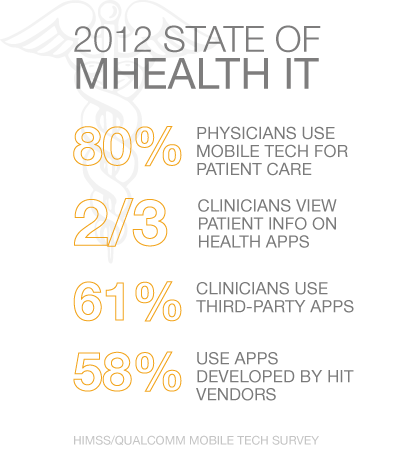The 2nd Annual HIMSS Mobile Technology Survey, sponsored by Qualcomm Life, found that over 90 percent of respondents reported physicians using mobile technology in their everyday operations. Eighty percent of physicians use mobile technology to provide patient care, and nearly two-thirds of respondents reported their clinicians viewed patient information or other health data using an app.
The 2nd Annual HIMSS Mobile Technology Survey, sponsored by Qualcomm Life, found that over 90 percent of respondents reported physicians using mobile technology in their everyday operations. Eighty percent of physicians use mobile technology to provide patient care, and nearly two-thirds of respondents reported their clinicians viewed patient information or other health data using an app.
The individuals surveyed were most likely to report that they had direct responsibility for developing the mobile technology policy within their organization (common titles included Director of IT, CIO, CMIO, CTO, analysts and manager-level IT).
When it came to mobile health policy, 46 percent of respondents indicated they were in the process of incorporating current and proposed federal policies into their existing policies. Changes to HIPAA and Meaningful Use Stage 2 were found to have the most impact on their policy-making process. The recent OCR HIPAA Audit Protocol may be helpful in developing mHealth policies aligned with the federal auditing/enforcement entity of HIPAA. The protocol was developed by the governing entity of HIPAA (the Office for Civil Rights) for auditors to use as a guideline when auditing covered entities and business associates. Read more about it in The HIPAA Police Are On Their Way!

2012 State of mHealth IT
Sixty-one percent of respondents reported that clinicians within their organization use third-party apps, while 58 percent of clinicians use apps developed by the organization’s HIT (health IT) vendor(s), indicating a healthy market for mobile health app developers, and supporting industries, such as HIPAA hosting providers that offer facilities and server management.
However, immaturity of vendors in the market is what accounts for nearly 50 percent of respondents’ concerns related to mobile technology use. The lack of funding and budget is the largest barrier to mobile tech use, coming in at 71 percent, and the lack of IT staff to manage/maintain mobile tech solutions accounted for 52 percent of concerns.
Benefits of using mobile technology for clinicians include improved access to patient information (82 percent); improved access to reference information (76 percent) and ability to view/interact with data from remote location (73 percent). While improved access to patient information and remote data access are significant benefits of adopting mobile use into the healthcare workflow, the benefits must be tempered by the use of proper technical security tools to not only comply with HIPAA standards, but to protect patient data from unauthorized use.
Keeping sensitive data in a secure, compliant location can limit the risks of a HIPAA data breach involving lost or stolen mobile devices. Accessing data remotely and working from any location is a perk for travelers, and using two-factor authentication can protect against online fraud and unauthorized access for anyone connecting to a network from a remote location. Read more about two-factor authentication here. Find out which tools can help you achieve HIPAA compliance and data/server protection by reading about our Technical Security services.
About mHIMSS
mHIMSS is the globally-focused mobile initiative offered by HIMSS. As a cause-based, mission-driven 51-year old non-profit, HIMSS created mHIMSS as a platform for all stakeholders within the global mobile community to drive positive, transformational change in health and healthcare through the best use of IT. Our initiative is grounded in three co-equal areas of focus: technology, workflow, and data exchange as they relate to promoting health, improving the quality and safety of care, making care more accessible, and increasing the cost-effectiveness of care. mHIMSS builds on the existing HIMSS strengths of convening stakeholders, sharing knowledge, providing world-class education, public policy, research, and content – entirely focused on mobile technologies, workflow, and data exchange.
mHIMSS is governed by the HIMSS Board of Directors, with strategic leadership provided by an advisory council and corporate roundtable. The advisory council and corporate roundtable are each comprised of stakeholders from all facets of the global mobile community. By harnessing the power, expertise, passion and commitment of volunteer members, mHIMSS provides timely and insightful content related to current issues, trends, and topics associated with mobile technologies and mHealth. To learn more about mHIMSS, please visit our website at www.mhimss.org.
Read more about Mobile Security and Mobile Health:
Latest Federal Mobile Malware Report
The Internet Crime Complaint Center (IC3), a partnership between the Federal Bureau of Investigation (FBI) and the National White Collar Crime Center (NW3C), recently released a report on the latest versions of mobile malware to affect Android smartphones. Continue reading →
Recommendations for Mobile Health IT Advancement
In June, the FCC (Federal Communications Commission) created a mHealth Task Force from a group of the nation’s leading mobile healthcare IT industry, including government and academic experts, according to a recent press release. This group generated a report with … Continue reading →
The Latest IT Security Stats: Are You At Risk?
Symantec’s now infamous 2011 Internet Security Threat Report is packed full of who, why, where and how when it comes to online attacks in the past year. Published in April 2012, the document highlights the latest trends in Internet security. …Continue reading →
References:
2012 mHIMSS Mobile Technology Survey Results from HIMSS Analytics








